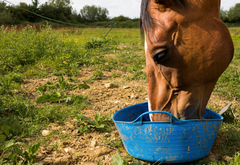Importance Of Pest Control For Horses

We all know that feeling; you’re sitting outside on one of the first warm weeks of spring and you feel a bite on your neck. We love the warm temperatures, but not so much the pests that come with it. Your horse is no exception. The most common of these pests are ticks, mosquitoes, gnats, and flies. These insects are parasites to horses, (which is why you see their tails swatting them away and them stomping in the field so often) but these annoyances can be managed with these tips and tricks.
Dangers of Parasites

The many varieties of parasites that can infect horses are silent killers. They can go unnoticed for extended periods of time, so it is vital to catch them early. The American Association of Equine Practitioners suggests that there are over 150 types of parasites that can affect horses. The most common of these that attack your horse’s outer skin, such as flies, ticks, mosquitos, and gnats. Others are transmitted by flies that can lay eggs in your horse’s skin or through infested manure being spread across the grass that your horse consumes. Mosquitos can cause internal damage as well as diseases such as Lyme Disease, encephalitis, West Nile virus (WNV), dengue, and now Zika. Many can also pass along malaria, yellow fever, heartworm disease, and elephantiasis. With good practices, however, these insects and scary diseases can be avoided.
How to Keep Bugs Away
Sprays

Topical sprays are one of the most important and effective factors for preventing pest outbreaks on your horse. (As well as alleviate some of the annoyance of flies.) A good topical spray should be natural, and safe for your horse’s skin. Use Tritec 14 or Endure sprays 2x a day in the AM and PM to repel culicoides gnats.
Manure
As we mentioned before, your horse can become infected with parasites through infected manure. These parasites leave their larvae behind, which is then spread onto lawns. The grass that grows from this lawn is then full of these parasites, some of the worst of which being small strongyles, roundworms, and tapeworms. Pick up and dispose of manure at least twice a week, even in sand and dirt yards. Do not spread manure on fields to be grazed by horses; instead, compost it in a pile away from the pasture before spreading it out.
Water Supply

For many obvious reasons, your horse’s water supply should be clean and fresh. Water near and around your property should not be left stagnant, as it will grow mosquitos in the warmer months. To regulate this problem, some people suggest adding fish to your water supply. They will eat some of these disease-causing parasites as well as some of the algae growing in the water. Remember to give your horses fresh water in addition to cleaning and maintaining any stagnant water sources that they have access to.
Our last tip to you is a little outlandish; more of a fun fact. Did you know that keeping bats on your farm will lower the number of bugs as well? These natural predators may seem like pests, but they are actually helpful pest control managers!
Keep your horse free from insects and bugs this spring and summer with these tips.



















